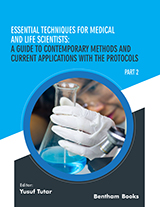Abstract
High Performance Liquid Chromatography (HPLC) is a powerful chromatographic technique to separate, identify and quantify components in a mixture. HPLC has superior features such as versatility, safety, sensitivity, accuracy and low detection capability. It mainly utilizes a column that separates components, a pump that delivers mobile phase through the column and a detector that detects the eluted components from the column. Separation of components occurs based on the interaction between the stationary phase and the components. HPLC is divided into several classes depending on the stationary phase and the separation process such as normal phase, reversed phase, and ion chromatography. It has significantly contributed to many fields of science such as pharmaceuticals, foods, environment and forensics. This chapter mainly focuses on the theoretical and practical aspects of HPLC.
Keywords: High performance liquid chromatography, HPLC analysis, HPLC detector, Mobile phase, Normal phase chromatography, Reversed phase chromatography, Stationary phase.






















